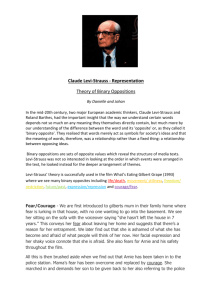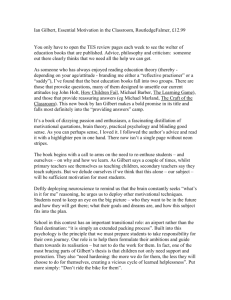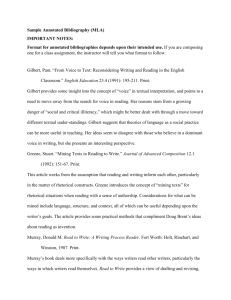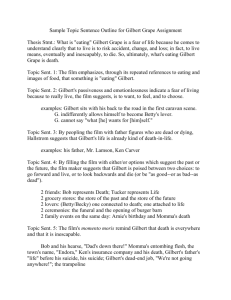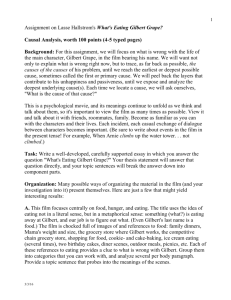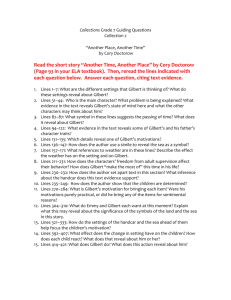What`s Eating Gilbert Grape? Study Sheet
advertisement
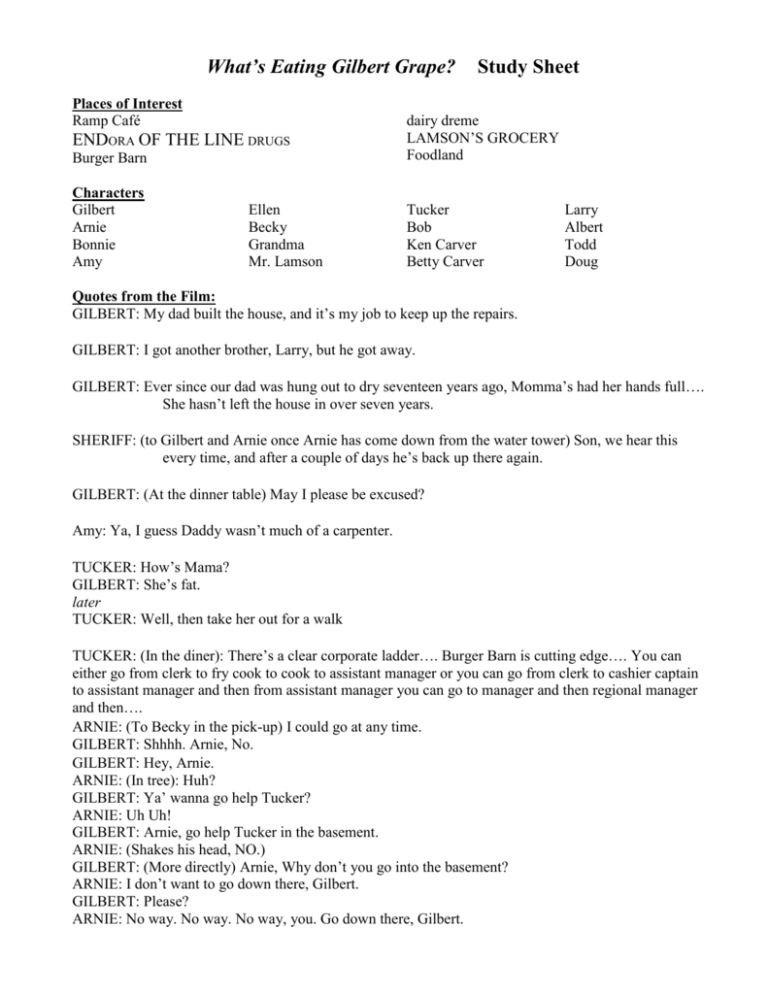
What’s Eating Gilbert Grape? Places of Interest Ramp Café ENDORA OF THE LINE DRUGS Burger Barn Characters Gilbert Arnie Bonnie Amy Ellen Becky Grandma Mr. Lamson Study Sheet dairy dreme LAMSON’S GROCERY Foodland Tucker Bob Ken Carver Betty Carver Larry Albert Todd Doug Quotes from the Film: GILBERT: My dad built the house, and it’s my job to keep up the repairs. GILBERT: I got another brother, Larry, but he got away. GILBERT: Ever since our dad was hung out to dry seventeen years ago, Momma’s had her hands full…. She hasn’t left the house in over seven years. SHERIFF: (to Gilbert and Arnie once Arnie has come down from the water tower) Son, we hear this every time, and after a couple of days he’s back up there again. GILBERT: (At the dinner table) May I please be excused? Amy: Ya, I guess Daddy wasn’t much of a carpenter. TUCKER: How’s Mama? GILBERT: She’s fat. later TUCKER: Well, then take her out for a walk TUCKER: (In the diner): There’s a clear corporate ladder…. Burger Barn is cutting edge…. You can either go from clerk to fry cook to cook to assistant manager or you can go from clerk to cashier captain to assistant manager and then from assistant manager you can go to manager and then regional manager and then…. ARNIE: (To Becky in the pick-up) I could go at any time. GILBERT: Shhhh. Arnie, No. GILBERT: Hey, Arnie. ARNIE: (In tree): Huh? GILBERT: Ya’ wanna go help Tucker? ARNIE: Uh Uh! GILBERT: Arnie, go help Tucker in the basement. ARNIE: (Shakes his head, NO.) GILBERT: (More directly) Arnie, Why don’t you go into the basement? ARNIE: I don’t want to go down there, Gilbert. GILBERT: Please? ARNIE: No way. No way. No way, you. Go down there, Gilbert. TUCKER: (From the basement) Is there a problem? Gilbert? Hey! ARNIE: Dad’s in there—oooooohhhhh. GILBERT: Shhhhh. ARNIE: (Pretends to hang himself and chokes and laughs) GILBERT: It’s not goodbye, it’s goodnight. ARNIE: I’m not going anywhere. GILBERT: (Eating watermelon) It must be incredibly frustrating then to be stuck here in this place—in Endora. BECKY: This place is as good a place as any. BECKY'S GRANDMOTHER: She's a worldly girl. BECKY: I’m a worldly kind of girl. BECKY: I’m sorry. She has this thing with beauty that . . . GILBERT: Ya’, I noticed that. BECKY: I’m not into that, that whole external beauty thing, ya know, 'cause it, it doesn’t last . . . .It’s what you do that really matters . . . . So, what do you want to do? GILBERT: Oh, I don’t know. I mean there’s not so much to do here, really. GILBERT: We don’t really move. I mean we’d like to, but my mom is sort of attached to the house. Attached is, I guess, not the right word—she’s pretty much wedged in. BETTY: Hey! I could’ve had any guy, any guy. I chose you, chose you. GILBERT: Why did you? BETTY: Because, I knew you’d always be there. Because, I knew you’d never leave. GILBERT: I had a nice time tonight. BECKY: I know. Later BECKY: I had a nice time. GILBERT: I know. BETTY: Go play. Later BETTY: Get out. BETTY: I was thinking about how if my boys turn out anything like you, … I was thinking about how that would be nice, for my boys to turn out like you…. BECKY: (Talking about Betty in Lamson’s) Are you going to miss her? GILBERT: Ya. BECKY: Good. Determinism The belief that all ostensible acts of the will are actually the result of causes that determine them. When used to describe a doctrine in a literary work, determinism has a wide range of philosophical possibilities, and the potential determining forces are many. In classical literature it may be fate or necessity. In writing produced by Christians of Calvinistic leanings it may be the predestined will of God. In naturalistic literature it may be the action of scientific law. In Marxist writing it may be the inevitable operation of economic forces. In the orthodox Freudian scheme of determinism, every detail of daily life, including such seemingly negligible matters are slips of the tongue and pen, is the traceable result of latent psychic mechanisms, so that casual forgetting becomes an episode of suppression of repression, and apparently random choices are far from random. In all these cases characters illustrate determinism because their actions are controlled from without rather than being the products of free will. One function of many literary devices, such as rhythmic repetition and rhyme, is to introduce new dimensions of determination and determinism in arrays otherwise governed only by whim, guesswork, serendipity, or mere possibility.
